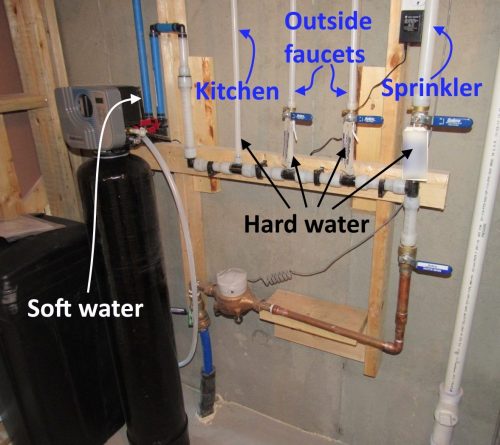Here in the Twin Cities metro area, running a separate water line for unsoftened cold water to the kitchen is standard procedure. I don’t like it, and I think this trend should change. But that’s just my opinion.
When I used to live in Minneapolis, this was a non-issue. Minneapolis has soft water and you can get by without a water softener. When I moved to Maple Grove, living without a water softener simply wasn’t an option. The water here is very hard, leaves deposits over everything, and gunks up faucets quickly. A working water softener is essential.
Much to my annoyance, the cold water to my kitchen wasn’t softened when I moved in. Visit just about any home built in the Twin Cities over the last thirty years, and about 80% of any other homes with water softeners, and you’ll find the same true. The cold water line to the kitchen bypasses the water softener on purpose. Plumbers go out of their way to do this.
I’ve had plumbers outside the metro area tell me that this is no longer being done, but this is almost all I see on new construction homes here in the Twin Cities. It is still standard practice.
Why do we have hard water in the kitchen?
I’ve asked many plumbers about this, and they’ve all given me the same answer: It’s an option. Some people like the option of having hard water available, both for consumption and for watering plants. I guess you’re not supposed to water your plants with soft water.
As for consumption, the idea is that we already get too much sodium in our diet, and we shouldn’t be getting even more from our water.
How much sodium is added to softened water? According to Pure Water Products, LLC, the amount of sodium a water softener adds depends on how hard the water is to start with. Here in Maple Grove, the water hardness ranges from 22 grains per gallon (gpg) to 25 gpg. To simplify it, they say to multiply the grains of hardness by 1.89, and you have the total mg of sodium added to water through the softening process in one 8 oz glass of water. In other words, an 8 oz glass of softened Maple Grove water would have 25 x 1.89 mg of sodium, or about 50 mg.
To put that into perspective, a single slice of Brownberry® whole grain Outnut bread contains 170 mg of sodium. It’s not nothing, and if you drink 50 glasses of water a day (or whatever number the experts recommend these days), that can add up to a lot of sodium. Maybe.
Yeah, but still
Despite the added sodium intake, I prefer soft water to the kitchen. Just a few months after moving to Maple Grove, my coffee maker bit the dust. All of those hard water deposits gunked it up and ruined it. A friend of mine had the same thing happen with an expensive espresso machine right after he moved from Minneapolis to Saint Louis Park.
Not only that, but the cartridges in my kitchen faucet used to constantly get ruined from the hard water deposits, and I’d have to replace the guts of my kitchen faucet every one to two years. I’d also constantly have hard water deposits build up around my faucet that I’d religiously clean every few months. It was very annoying.
To me, the downsides of hard water outweigh the downsides of soft water.
How to know what you have
If you have a water softener and you want to know whether or not the cold water running to the kitchen is softened, you have a few options. First, look at the base of your faucet. If it’s full of hard water deposits, the answer is yes. You have hard water coming into your kitchen. You’re welcome.
If you want a more technical method, you could buy some water hardness test strips. If the cold is hard, you’ll find a major difference in hardness between the hot and cold water at the kitchen sink.
Finally, you could go down to your basement and look at the water lines. If you have a 1/2″ water line with no shutoff valve tapped off of the water line before the softener, you’re surely looking at a hard water line running to the kitchen.
If you want to change this, it’s pretty simple. Just re-route the water line to the kitchen from the hard side to the cold side of the water softener. If you’re not comfortable doing that kind of work, hire a plumber. In most cases, this will be a quick and easy job, and you’ll be glad you did it.
I re-routed my own water line to supply softened water to the kitchen sink about a year ago and now I’m happy. All the time.
If you want the benefits of soft water but you don’t want the added sodium intake, install a reverse osmosis system, which will remove the added sodium. A filter won’t.

